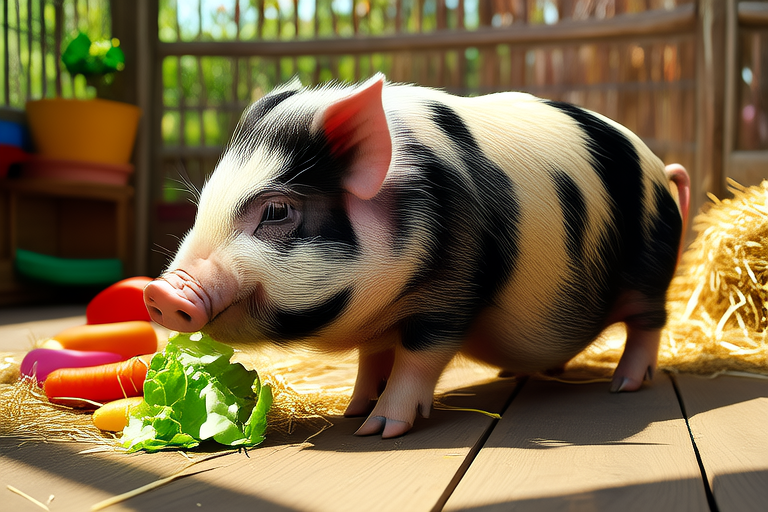How to Create a Happy and Healthy Home for Your Guinea Pig
Welcome to the wonderful world of guinea pig ownership! These charming little creatures are not just pets; they are companions that require care and attention to thrive. Creating a happy and healthy home for your guinea pig involves understanding their specific needs and providing them with an environment that supports their well-being. This guide will walk you through everything you need to know to ensure your guinea pig lives a long, healthy, and joyful life.
Appropriate Cage Size and Setup
The first step in creating a happy home for your guinea pig is choosing the right cage. A spacious cage allows your pet to move around freely and reduces stress. The minimum recommended size for a single guinea pig is about 7.5 square feet (2.3 meters squared), but if you have more than one, increase the space accordingly. A larger cage also provides room for toys, tunnels, and other enriching activities.
When setting up the cage, consider the height of the sides. Guinea pigs are excellent jumpers, so ensure the sides are high enough to prevent escapes. Place the cage in a quiet area away from direct sunlight, drafts, and excessive noise. Adding soft bedding material like paper-based bedding or aspen shavings can help absorb moisture and odors while providing comfort.
Bedding Choices
Selecting the right bedding is crucial for your guinea pig’s comfort and health. Avoid cedar and pine shavings, as they contain aromatic oils that can irritate your pet’s respiratory system. Instead, opt for safe options such as paper-based bedding, recycled paper products, or aspen shavings. Regularly change the bedding to maintain cleanliness and reduce the risk of respiratory issues.
Dietary Needs with Recommended Foods
Guinea pigs have unique dietary requirements, particularly concerning vitamin C. Unlike most animals, they cannot produce this vital nutrient on their own, making it essential to include it in their diet. Fresh vegetables rich in vitamin C, such as bell peppers, broccoli, and kale, should be a part of their daily meals. Additionally, offer hay, which aids digestion and keeps teeth healthy. Timothy hay is particularly recommended for adult guinea pigs, while alfalfa hay is suitable for younger ones due to its higher calcium content.
Commercial pellets formulated specifically for guinea pigs provide a balanced source of nutrients. However, avoid overfeeding pellets, as they lack the fiber found in hay. Always provide fresh water in a spill-proof bottle or bowl to encourage consumption.
Hydration Importance
Water is vital for your guinea pig’s health. Dehydration can lead to serious health problems, so ensure constant access to clean, fresh water. Use a sipper bottle designed for small animals to keep the water clean and prevent spills. Check the water level daily and clean the bottle regularly to prevent bacterial growth.
Exercise Requirements
Physical activity is important for your guinea pig’s overall health. In addition to the space provided within the cage, allocate time each day for supervised play outside the cage. Guinea pigs enjoy exploring, running, and playing with tunnels and toys. Ensure the play area is safe and free of hazards, such as electrical cords or small objects that could be swallowed.
Hygiene and Cleaning Tips
Maintaining good hygiene is key to preventing illnesses. Clean the cage weekly, removing all soiled bedding and thoroughly washing the cage with a pet-safe cleaner. Rinse the cage thoroughly and allow it to dry completely before adding fresh bedding. Regular grooming, especially for long-haired guinea pigs, helps remove loose fur and prevents matting. Trim nails as needed to prevent discomfort and potential injuries.
Temperature Control
Guinea pigs are sensitive to extreme temperatures. They thrive in environments with temperatures between 65°F and 75°F (18°C and 24°C). Avoid placing the cage near windows where temperatures can fluctuate dramatically. In colder months, provide additional warmth with a soft blanket or a heat pad, ensuring it does not exceed 90°F (32°C).
Social Interaction Guidelines
Guinea pigs are social animals and benefit from companionship. If possible, keep them in pairs or small groups. Introduce new guinea pigs gradually to prevent territorial disputes. Spend quality time with your guinea pig daily, handling them gently and speaking softly. Positive interactions help build trust and strengthen the bond between you and your pet.
Signs of a Healthy Guinea Pig
A healthy guinea pig exhibits certain behaviors and physical characteristics. They should have clear, bright eyes, clean ears, and a glossy coat. Regular bowel movements indicate proper digestion, and active behavior suggests good health. A healthy guinea pig will also be curious and playful, showing interest in their surroundings and food.
Common Health Issues to Watch For
Despite your best efforts, your guinea pig may still encounter health issues. Watch for signs of illness such as lethargy, loss of appetite, discharge from the nose or eyes, or changes in bathroom habits. Dental issues, including overgrown teeth, can cause pain and difficulty eating. Regular veterinary check-ups can help catch and address these issues early.
Guinea pigs are prone to respiratory infections, which can be caused by poor air quality or overcrowding. Keep the cage well-ventilated and clean to minimize the risk. Parasites like mites can also affect your pet, causing itching and hair loss. Consult a veterinarian if you suspect any health problems.
Creating a happy and healthy home for your guinea pig requires attention to detail and a commitment to their well-being. By providing ample space, a nutritious diet, regular exercise, and proper hygiene, you can ensure your guinea pig enjoys a long and fulfilling life. Remember, every guinea pig is unique, so pay close attention to your pet’s individual needs and preferences. With love and care, you’ll have a loyal companion for years to come.
